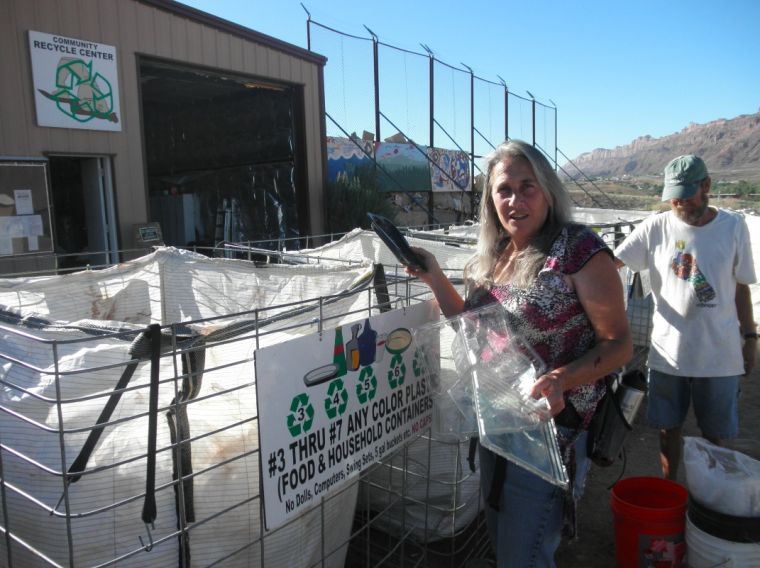Some information may be outdated.
Because of a policy change half-way around the world, Tom Edwards, the director of Grand County’s Solid Waste Special Service District, and his team have been spending more time sorting through the plastics that the recycling center receives.
The news from Interwest Paper comes as a result of tighter standards from the Chinese government regarding the plastic it imports from the U.S.
“Interwest Paper let me know that if there are any clamshells (the plastic containers used for things like strawberries and sandwiches) in it they are only going to pay one cent per pound,” he said. “So I had to sit there and we had to re-sort seven bails that we had already made. So it cost me five hours for the last seven days.”
Clamshells are a No. 1 plastic. Because clamshells are often contaminated by remaining food, recycling companies are now requiring they be put in with Nos. 3-7 plastic, which are low-grade and also often contaminated.
Much of the contamination comes from the containers being inadequately washed before being picked up by recycling companies. This has led to them becoming the subject of increased scrutiny in China over the last several months.
“Basically everything that’s left over when you are recycling plastics gets dealt into that category,” said Beau Peck, the director of sales and marketing for Interwest Paper, the group that transports much of the material collected at Grand County’s Community Recycling Center. “It’s basically all of your left overs.”
Starting in 2007 one of America’s top exports to China has been recyclable materials. According to the Washington Post, in 2011 America sold China $10.8 billion of paper and metal scrap, and $500 million worth of plastic; around half of all the plastic recycled in the U.S.
After arriving in China, the plastic is re-sorted and processed, and the resins used in manufacturing.
But starting in February of this year China began ‘Operation Green Fence.’ Under this program the government has become much more stringent in the quality of plastics that it is willing to purchase.
The reason for this is that a large number of the shipments of recycled plastics that China had been receiving were substandard or contaminated and thus unusable.
“They are inspecting everything, and anything contaminated or dirty they are not allowing into the country. Typically the Nos. 3-7 grades are dirty so a lot of people are refraining from shipping,” Peck said. “It’s just a high-risk item to move.”
The problem with this is that, because the American recycling industry has become so reliant on exporting, there has been very little development of domestic recycling plants, according to numbers published by Resource Recycling.
So with many recycling companies no longer exporting plastics to China, the market price for Nos. 3-7 plastics has plummeted.
Because of this drop in value Rocky Mountain Recycling, a group that Grand County has sold recyclables to, is no longer accepting the plastics.
Interwest Paper is still taking number Nos. 3-7 plastic but they are having to stock pile it until they can find a buyer and they are being much more picky about the other plastics they do take.
However, Edwards believes that the drop in price will not have too large of an impact on Grand County’s recycling.
“The Nos. 3-7 never paid us a penny anyway,” he said. “(But) seeing as how we were shipping other stuff with it it didn’t cost us anything.”
Nos. 3-7 plastic also only makes up about 8-percent of the plastic that is dropped off at the Community Recycling Center, Edwards said
The issue for Sara Melnicoff, the director of Moab Solutions, a non-profit that works to promote recycling in Grand County, is that if the plastics are no longer recycled then they would most likely end up in the landfill.
“Our number one thing has to be search the markets even if you lose a little money recycling, because wasting is just so negative in every way,” she said.
Even though America’s ability to process the recycled plastic is very limited, Peck’s Interwest Paper is exploring several alternatives to exporting that may ensure that Moab’s Nos. 3-7 plastics continued to be recycled.
“There is some talk that local processes can turn it into diesel fuel and reuse it that way,” he said. “A lot of that is industry in their infancy. A lot of investors and a lot of talk.”
But one such company that Peck has been talking with is the Salt Lake City based PK Clean.
However, Peck believes that the best solution is better cleaning and sorting of the plastics, and that starts with ordinary citizens. So long as that happens, exports could continue and far less of the plastic put in recycling bins would end up in landfills.
“If it’s good clean plastic the price is there,” he said.
To that end Grand County’s Solid Waste Special Service District is planning a campaign to educate the public about what is happening and how to better separate and clean their recycling.
“People are always putting trash (in the recycling) and then they (the Community Recycling Center) have to pay to dispose of it,” Melnicoff said.
“(The Chinese) are inspecting everything and anything contaminated or dirty they are not allowing into the country. Typically the No. 3 through No. 7 grades are dirty so a lot of people are refraining from shipping.”
Appreciate the coverage? Help keep local news alive.
Chip in to support the Moab Sun News.





